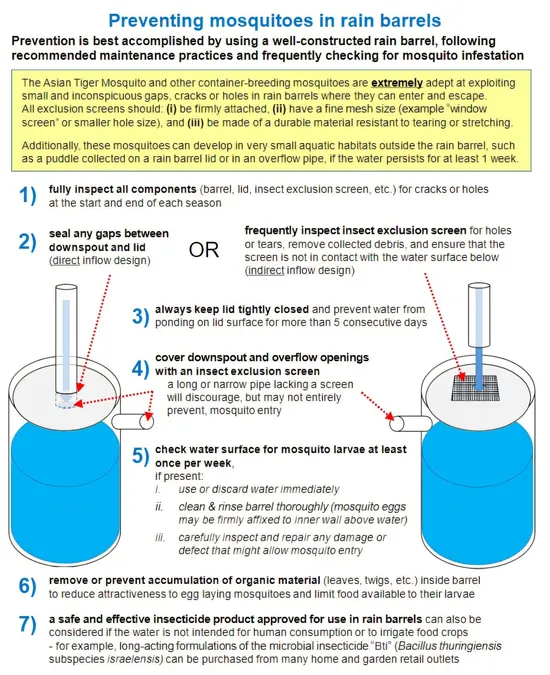
Rain Barrels: The Eco-Friendly Solution That Could Become a Mosquito Paradise!
2025-04-07
Author: Arjun
Introduction
As the world becomes increasingly aware of environmental conservation, rain barrels are emerging as a popular choice for homeowners looking to conserve water. These convenient devices collect and store rainwater for irrigation, potentially saving hundreds of gallons of water annually and helping to mitigate stormwater runoff. However, while they offer ecological benefits, improperly maintained rain barrels can also attract pesky mosquitoes and create breeding grounds for these disease-carrying pests.
Recent Study Findings
A recent study from the University of Illinois, published in the Journal of Medical Entomology, sheds light on the prevalence of mosquitoes in residential rain barrels. Researchers conducted a survey across Champaign County, focusing on 115 rain barrels from 53 different households between June and September 2016. Alarmingly, they found that over 50% of the households had at least one rain barrel infested with mosquitoes.
Health Risks Associated with Mosquitoes
Mosquitoes are not just a nuisance; they are vectors for serious illnesses including West Nile virus and other mosquito-borne diseases, which continue to plague public health, particularly in urban settings where standing water can be abundant. Given their lifecycle depends on standing water, many backyard environments unwittingly provide ideal breeding grounds.
Expert Insight
"Rain barrels are excellent for residents looking to reduce water consumption," stated Brian Allan, the study’s Principal Investigator and Professor of Entomology at the University of Illinois. However, the study aimed to assess the risk these barrels posed as potential mosquito habitats, a question that had not yet been thoroughly investigated.
Preventive Measures
The findings supported the hypothesis that rain barrels can facilitate mosquito breeding. Researchers emphasized the importance of preventive measures. For instance, barrels equipped with mesh coverings significantly deter mosquitoes from accessing the standing water. Furthermore, the study examined various mosquito prevention techniques employed by homeowners, revealing that methods like using the bacterial insecticide Bacillus thuringiensis israelensis (Bti) or introducing goldfish to feed on larvae effectively reduce mosquito populations.
Homeowner Education and Community Initiatives
While many homeowners knew some immediate methods—like dumping out standing water—few understood the long-term solutions necessary for true mosquito-proofing. “Our findings highlighted straightforward strategies for minimizing mosquito habitats, but they hinge on educating homeowners,” remarked Becky Cloud, the study's lead author and graduate student in Ecology, Evolution & Conservation Biology at the University of Illinois.
Conclusion
It is essential for both current and prospective rain barrel owners to recognize the importance of these preventive measures. Future community outreach initiatives from educational institutions, public health departments, and mosquito abatement agencies could play a pivotal role in training residents on how to keep their rain barrels mosquito-free.
By implementing these strategies, homeowners can enjoy the benefits of rain barrels while minimizing health risks related to mosquitoes. With the right knowledge and commitment to maintenance, rain barrels can remain an effective and environmentally friendly tool, ensuring that we safeguard our health while caring for our planet!
Call to Action
Could this be the ultimate solution for eco-conscious homeowners? Discover the best practices today!


 Brasil (PT)
Brasil (PT)
 Canada (EN)
Canada (EN)
 Chile (ES)
Chile (ES)
 Česko (CS)
Česko (CS)
 대한민국 (KO)
대한민국 (KO)
 España (ES)
España (ES)
 France (FR)
France (FR)
 Hong Kong (EN)
Hong Kong (EN)
 Italia (IT)
Italia (IT)
 日本 (JA)
日本 (JA)
 Magyarország (HU)
Magyarország (HU)
 Norge (NO)
Norge (NO)
 Polska (PL)
Polska (PL)
 Schweiz (DE)
Schweiz (DE)
 Singapore (EN)
Singapore (EN)
 Sverige (SV)
Sverige (SV)
 Suomi (FI)
Suomi (FI)
 Türkiye (TR)
Türkiye (TR)
 الإمارات العربية المتحدة (AR)
الإمارات العربية المتحدة (AR)